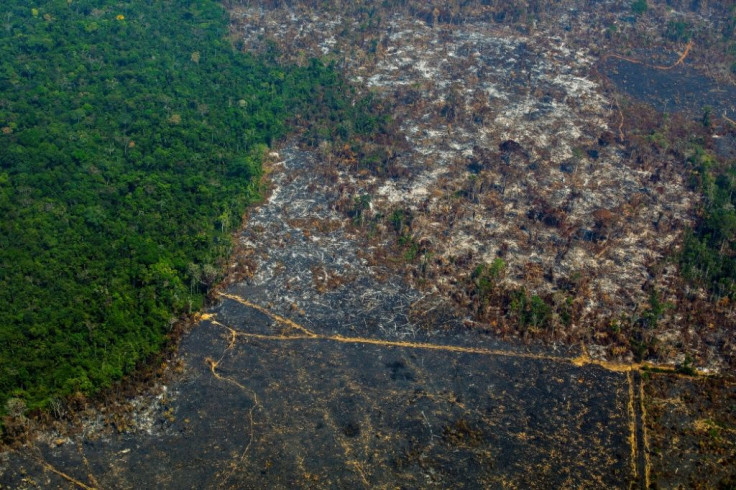For Forest Survival, Corporations Are Accountable To Uphold Indigenous Land Rights

As climate change deepens, forests –– those lush, abundant, mysterious stands of trees that for millennia have quietly produced the air we breathe and the water we drink –– have never been more critical to our survival. It’s become clear that, as leading scientists have said, “Our planet’s future climate is inextricably tied to the future of its forests.” For a climate stable future, we must keep forests standing, as they are one of the most effective tools we have to combat climate change. Thankfully, the basic prescription for saving much of the world’s forests is refreshingly simple: hold corporations accountable for their role in driving deforestation and uphold Indigenous rights to their ancestral lands.
Forty percent of global deforestation is the result of commodity production, mainly for beef, soy, palm oil, pulp, paper, and timber products. Corporations and their long-reaching supply chains, together with the banks and financiers providing the capital, are clearing forests, ignoring land rights and other human rights, and further destabilizing our climate to turn the quickest profit. Our store shelves are lined with products made at the expense of our forests and banks are using our money to invest in the destruction.
Tropical deforestation accounts for a huge percentage of the world’s annual carbon emissions. If tropical deforestation were a country, it would be the third largest emitter in the world, only behind China and the United States. And emissions from deforestation are only getting worse, having more than doubled in the last few years. As tropical forests are cut down, a terrible, self-reinforcing loop is created: as forests and carbon-rich peatlands are razed, they release enormous amounts of greenhouse gasses into the atmosphere, and at the same time, destroy the very trees and peatlands that could absorb that carbon and safely store it underground.
Given this context, it turns out one of the most important 2020 New Year’s resolutions for our global climate was actually made a decade ago. That’s when over 400 multinational companies in the Consumer Goods Forum (CGF), including multinational brands like Unilever, Procter & Gamble, Colgate-Palmolive and Nestlé, set 2020 as their deadline to fully remove deforestation from their supply chains. Ten years on, almost none of these companies are on track to meet their commitments. This is not because the companies lack capability, it is because they lack sufficient will, and that is unacceptable. With the climate crisis wreaking havoc across the globe, it’s past time to hold these massive companies accountable to their promises. These corporations are vulnerable to market pressure and are fiercely protective of their brands’ reputations. As consumers, we have the ability to change industry practices. 2020 must be the year that we demand that multinational banks and brands take real and meaningful action to stop profiting off of deforestation and human rights abuses.
While deforestation is a significant contributor to the current climate crisis, protecting and restoring forests plays an outsized role in the solution. According to the Intergovernmental Panel on Climate Change (IPCC), reducing deforestation represents one of the most effective ways to mitigate climate change globally, with the potential to reduce global greenhouse gas emissions by nearly a third.
The world is waking up to the importance of defunding fossil fuels, but keeping forests standing is just as important. To avoid a greater climate crisis, we don’t need high-tech carbon removal solutions, we just need forests. Or, as the scientists say: “The ‘natural technology’ of forests is currently only proven means of removing and storing atmospheric CO2 at a scale that can meaningfully contribute to achieving carbon balance.”
To keep forests standing, we must uphold Indigenous rights, because strong and organized local and Indigenous communities are one of the most effective ways of stopping deforestation. Local and Indigenous communities have managed their forests since time immemorial, while local and national governments –– not to mention corporations –– far too often fail to recognize their land rights. Despite only stewarding 22 percent of the world’s land, Indigenous territories protect 80 percent of the planet’s biodiversity. It’s an amazing fact, and clearly shows that Indigenous and frontline communities have been successfully protecting and managing their lands for generations –– too often at the cost of their own lives.
It is imperative that we provide tangible support to Indigenous and frontline communities as they face land grabbing, criminalization, violence and more. We must support communities in their fight to gain legal rights to their land and ensure their ability to protect and manage it –– sustaining their ways of life and safeguarding the vast majority of the world’s biodiversity from extinction. By supporting those that protect the forest, we can slow the worst impacts of climate change.
Ginger Cassady is Executive Director at Rainforest Action Network
© Copyright IBTimes 2025. All rights reserved.





















